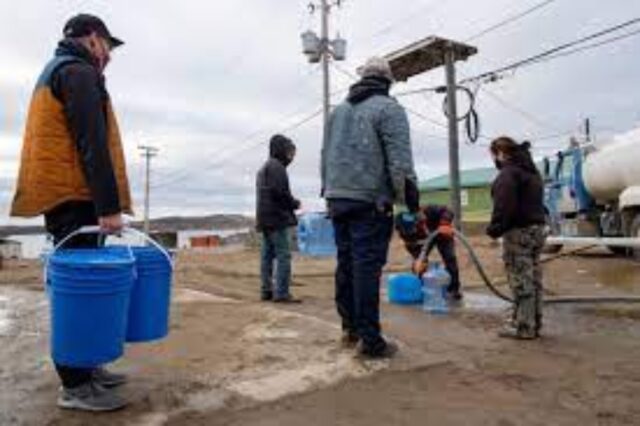The authorities of the Canadian Territory of Nunavut (close to Greenland) have declared a state of emergency in Iqaluit, its capital, on Thursday. The reason is that this town, inhabited mainly by members of the Inuit people, is experiencing a crisis in the supply of clean water. Many people have pointed out for several days that this vital liquid – coming from a treatment plant – gives off a smell of gasoline. “We are taking this problem very seriously. We work with different levels of government to ensure that the people of Iqaluit have access to safe water” said Jeannie Ehaloak, Minister of Community Services for Nunavut.
The results of different samples sent to laboratories in the south of the country are expected to be published in a few days. Since Tuesday, the inhabitants of Iqaluit have received the recommendation not to drink the water or use it in the preparation of food, as well as in the personal hygiene of children and pregnant women. Schools and government buildings have been closed since Wednesday.
Out of reach

The water in the Iqaluit stores has disappeared from the shelves. A one-liter bottle can fetch 9 Canadian dollars (US $ 7.25); 24 dollars (19 from the neighboring country) for a package of a dozen 330-milliliter bottles. Various products in Inuit communities are priced astronomically due to transportation costs and despite federal subsidies.
The Government of Nunavut announced the shipment of 80,000 liters in bottles to be distributed among the approximately 8,000 inhabitants of Iqaluit. The Agnico Eagle company, which operates several mines in the area, will distribute an additional 15,000 liters. Several residents are collecting the liquid in the Sylvia Grinnell River, located about 3 kilometers from the town. A team of volunteers is in charge of distributing it especially among elderly people or those who do not have vehicles.
Not an anecdotal issue
The problem of access to safe water is for the indigenous peoples of Canada. Despite the efforts of the federal government in recent years, 32 communities in the country still have difficulties to make use of this vital liquid. The construction and operation of treatment plants represent one part of the solution; the maintenance of these plants and the creation of pipe networks to avoid accumulation in tanks that favor contamination are also cardinal issues.
Janet Pitsiulaaq Brewster, deputy mayor of Iqaluit, told that, although the exact cause of the problem is still unknown, the drinking water infrastructure in this town is “in ruins”, in addition to the housing crisis contributing to negative form. For Brewster, the long-term remedy is an investment – on the part of all levels of government – that could be around 100 million Canadian dollars (about 81 million US dollars).

